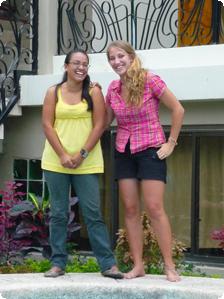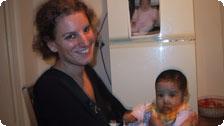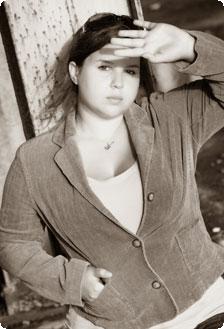by Mark Kennedy
They’re fresh out of university and have nil business experience. But with blood, sweat, tears and a little luck, two young women now find themselves the owners of Hostel Nucapacha. If you’re in Ecuador, don’t be surprised if you find yourself lounging by their pool.
Owning and running a youth hostel is not usually the first job you land after graduating from university. But the co-owners of a brand-new hostel in Guayaquil, Ecuador, aren’t your usual university grads.
Lounging comfortably in patio chairs under the shade of a mango tree, school friends Verena Treptau and Maria Carolina Salazar don’t seem like your typical successful, ambitious businesswomen. But by looking around the three-month-old Hostel Nucapacha (meaning ´our universe´ in Quechua), one gets a sense of what the two 24-year-olds have accomplished – in the space of just a year.
¨That part didn’t exist at the time,” Ms Treptau says, pointing to the second floor section of dorm rooms. “We had the upper floor torn down and our architect showed us some of his designs, but we knew what we wanted.”
Ms Treptau, a German exchange student who fell in love with Ecuador, and Ms Salazar, a native of Ecuador, teamed up, and before even graduating, decided to go into business together.
¨I didn’t really know what I wanted to do after graduating, but I knew that I wanted to have a business,¨ Ms Salazar says ¨I got a job working in a hostel and learned the business pretty well. That’s when we thought we could do it for ourselves. ¨
But this was in April of 2008, when the global financial crisis was tearing the profit margins of the world’s biggest banks to shreds. Earnings losses, sharp declines in share value and massive employee layoffs were having an impact the world over, and it seemed that no industry or country – least of all Ecuador – were unaffected.
But Ms Treptau and Ms Salazar were undeterred. The two – with no prior business experience and fresh out of university – were able to secure not one, but two bank loans.
An impressive feat, considering that lending from the South American country’s banks fell 7.3 percent in 2008 after Ecuadorian President Rafael Correa´s debt payment default left many lenders cash-strapped.
But with a little inside help, family support, and small loans from a few private investors, the ´dynamic duo´ were able to get the finances they needed. Their shiny new undergrad degrees in business administration didn’t hurt either.
¨Getting the loans was actually pretty easy,¨ Ms Salazar said. ¨We have a friend who works in one of the banks. She helped us with all the paperwork.¨
¨My parents helped me get a loan from a German bank, and were the co-signers,¨ Ms Treptau says.
Then there was finding a location. They came across a dilapidated old mansion situated in the city’s northern suburbs, and although it needed a lot of work it turned out to be a Godsend.
¨We looked at a few places, but we wanted to be in an area where you can find bars, restaurants, and this location was ideal,¨ Ms Treptau said, looking around again. ¨It’s a safe area and it’s 10 minutes away from everything (by bus).”
What came next was the daunting and stressful task of hiring and managing architects, contractors and labourers to turn the abandoned house into what it is today.
DIY Divas
The construction and refurbishment of the building was plagued by problems almost from the outset. Some of the workers, usually freelance tradesmen who know a little bit about everything involving construction, did shoddy and substandard work. Sometimes cable, paint and other building materials would go missing from the site.
¨When they made the floor, they left the metal components a meter short,¨ Ms Treptau says. ¨We trusted people too much and it ended up costing us… we went way over budget.¨
With their money dwindling and work left incomplete, the two took matters into their own hands – literally.
¨We painted the inside (of all the rooms), laid tiles in the bathrooms, put up the ceiling panels and wired up many of the light fixtures, ¨ Ms Treptau says.
Ms Salazar jumps in: ¨We even had to carry around bags of sand and rubble – we built up a lot of muscle doing that, ¨ she says with a laugh.
Eventually, the place came together and Hostel Nucapacha came into existence. And by opening the hostel, they filled a void in a city where budget-friendly accommodations for backpackers are few and far between.
So what does it feel like owning your own business at such a young age?
¨It doesn’t feel like work because we enjoy it,¨Ms Salazar says.¨It feels good not having to sit in an office all day working for someone else.¨
But running the new hostel doesn’t seem to be enough to keep these women busy. When not tending to the day-to-day business, Ms Treptau is working on a master’s thesis in international development, and Ms Salazar teaches human resources and administration to local high school students.
Despite the busy schedule, the two still manage to have a social life, but it takes some planning.
¨It sounds bad, but sometimes we just have to get out of this place, so we grab hold of our social lives,¨ Ms Treptau says. But someone has to be here at all times, so it’s hard to go out together.¨
¨It’s also nice here because our friends will drop by the hostel all the time.¨
When asked if they have time for a significant other in their lives, the two looked at each other and laughed, seemingly at some inside joke.
¨No, no guys for me right now,¨ Ms Salazar says.¨Other things are more important¨ Ms Treptau jumps in: ¨like having fun!¨ Everyone laughs, including a few guests who have overheard the conversation.
¨Boyfriends can be very demanding in this country,¨ she adds, ¨but that doesn’t mean when we go out, we don’t like it when guys buy us drinks!¨
—
Hostel Nucapacha
Urdesa Central, Balsamos Sur No. 308, Guayaquil, Ecuador
Tel: (593) 4261 0553
Email: info at nucapacha.com
www.nucapacha.com
—
Author
Mark Kennedy is currently a freelance writer traveling through South America. Prior to hitting the road, he was the Business Editor of the Bermuda Sun. His articles have appeared in publications in Canada, Taiwan, Bermuda and the UK.










